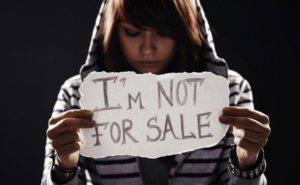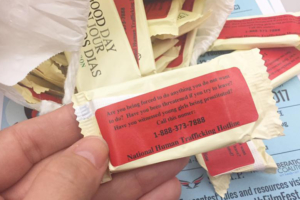Statistics about human trafficking are hard to digest. Consider the following:
- 9 million people worldwide are victims of forced labor, including sexual exploitation at any given time (United Nations)
- 5 million people in the U.S. are human trafficking victims at any given time (GRACE Commission)
- Between 200 and 400 adolescent girls are sold online in Georgia per month (Shapiro Group)
- 7,200 men purchase sex from a minor every month in Georgia (Shapiro Group)
- Traffickers in Atlanta make an average of $33,000 per week (Urban Institute)
 As these figures suggest, the human trafficking industry is enormous. Traffickers know no bounds and operate in all communities, regardless of income and race. The U.S. Department of Health and Human Services reports the top five venues for sex trafficking are hotels and motels, commercial-front brothels, online ad venues, residential brothels, and are street-based. The top five venues for labor trafficking are agriculture, traveling sales crews, construction, domestic work, and hospitality.
As these figures suggest, the human trafficking industry is enormous. Traffickers know no bounds and operate in all communities, regardless of income and race. The U.S. Department of Health and Human Services reports the top five venues for sex trafficking are hotels and motels, commercial-front brothels, online ad venues, residential brothels, and are street-based. The top five venues for labor trafficking are agriculture, traveling sales crews, construction, domestic work, and hospitality.
Victims span all demographics, and there is no “typical” victim. Risk factors include homelessness, isolation, emotional distress, poverty, substance abuse, mental illness, and developmental delay. Shame and fear often prevent victims from asking for help, making them hard to identify and rescue.
Rev. Victoria Jarvis of the Episcopal Diocese of Atlanta’s Commission on Domestic Minor Sex Trafficking described human trafficking as an “underground” crime. “The majority of buyers are from well-off areas in Atlanta; they are doctors, teachers, clergy, and others you just don’t think of. On the other hand, we think of the victims, especially the kids, as ‘throw-away’ children. But they’re not throwaways.”
Because the issue of human trafficking is so complex, eradicating it requires a variety of approaches. Georgia has tightened relevant laws, established specialized investigative units, and conducted awareness campaigns.
 SOAP Up Atlanta
SOAP Up Atlanta
Historically, the Diocese’s Commission focused its efforts on legislative initiatives. Recognizing the desire of many parishes to join its efforts, the Commission decided to launch a large-scale project in 2018: SOAP Up Atlanta. Prior to Super Bowl LIII, which was expected to prompt a boom in sex trafficking, hundreds of volunteers labeled 60,000 bars of soap with information about the National Human Trafficking Hotline. The soap was delivered with posters to hundreds of hotels throughout Atlanta. Rev. Jarvis considers the project very successful: “It’s impossible to know how many victims reached out for help, but we have faith many girls put the soap in their pockets or purses and will call when ready.”
Sadly, COVID-19 has put the Commission’s work on hold. Rev. Jarvis is particularly concerned for today’s youth, stating that “many children are at home now, alone with technology, and lured into sex trades by strangers online.” The Diocese is anxious for the Commission to restart its work, which will likely begin after the holidays.
How You Can Help
In the meantime, Rev. Jarvis recommends people interested in helping learn everything they can about human trafficking and reach out to local service providers. Local agencies and organizations serving victims of human trafficking include:
- Atlanta Mission
- City of Refuge
- Gateway Domestic Violence Center
- Georgia Cares
- Out of Darkness
- The Salvation Army
- Tabitha’s House
- Tapestri
- youthSpark

